Leadership
Understanding others, understanding yourself
Flip through Joe Alessi’s vitae, and there’s a certain theme that keeps popping up: leadership.
Whether it’s teaching at the U.S. Military Academy, serving as an assistant professor of Leadership at Washington University in St. Louis, presenting at the International Leadership Association in Brussels, or serving as a mentor for his school football and hockey teams, Alessi’s career is defined by the subtleties and science of guiding, commanding and directing others to succeed.
And all of that gushes out when you meet him face to face – energetic, composed, astute, confident and full of stories from his wide-ranging 30-plus year career in the U.S. Army and academia.
That career has landed him back home at his alma mater, YSU, where he is now teaching part-time in the History department. Y magazine asked Dr. Alessi to share his thoughts on something he knows more about than any of us: leadership.

Scholars and theorists define and conceptualize “leadership” in many ways. Simply put, leadership is the ability to influence others to accomplish a task regardless of situation, demographics or group dynamics. In 20 years of holding leadership positions, I learned one simple thing: leadership is about understanding people and that the first person an individual needs to learn to lead is themselves.
I created and used two simple tools to assist me in this endeavor. The first being, “The First Rule of Leadership,” which is to strip oneself of Ego, Emotion and Sensitivity. In short, no one is as good as they believe. Simply because you occupy a leadership position does not entitle you to view yourself as better; you are simply overall responsible for the success and failure of your organization which rests on your subordinates. You exist and occupy your position to facilitate their success.
Too often, we allow our sense of self-worth, a.k.a. ego, to affect our emotions, the most powerful being anger/hate, fear and love. It is essential that a leader strip themselves of emotion when making decisions. Leadership is not a popularity contest, but about action based on decision making, practical experience, factual reasoning and situational dynamics. Whether it is good or bad, the decision made will make people unhappy. You will disappoint, frustrate or anger people and draw criticism, and that is okay. “Everybody’s baby is ugly,” and people will point out how uncharismatic your decision is, but don’t let it bother you. Simply proceed and succeed.
By following this first rule of leadership, I believe it assists an individual with grounding themselves in reality and with affording themselves the opportunity to be more genuine, confident and real with their subordinates, which strengthens relationships and fosters team success.
The second tool I employed is the “Morning Challenge,” consisting of three questions. “What did I do yesterday that I can do better today?” Each day, everyone can improve on their known skill set. The second, “What can I learn new today?” There is no terminus to learning. This helps individuals acquire additional skill sets. The last, “What kind of impact do I make today?” Every day you live, you leave an impact, positive or negative, great or small.
The thing I discovered most about these two tools is that while they apply to the individual, they also apply to any organization. By influencing people to become better versions of themselves and by holding your organizations to these philosophies, both the people and the team inexorably become more efficient and effective.
Alessi earned bachelor’s and master’s degrees from YSU in the 1990s and later a PhD in History from St. Louis University.
